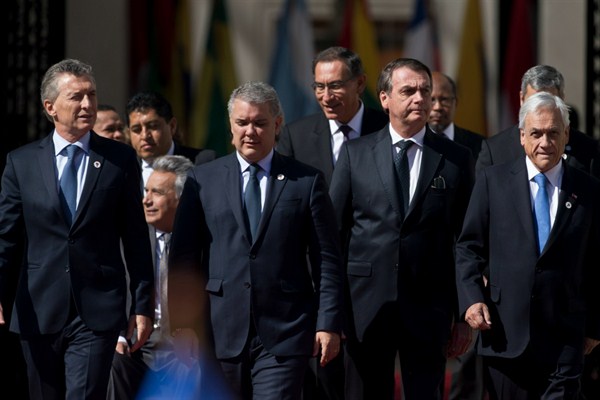Last month, South American leaders, many of them politically conservative, gathered in Chile to launch a new regional body. Although they didn’t say it, they had come to bury Unasur, or the Union of South American Nations, the left-leaning bloc that has been led by Venezuela since its founding a little over a decade ago. They hoped that their new group, the Forum for Progress in South America, or Prosur, would set the stage for a new era of integration and cooperation in the Southern Cone. But critics were quick to predict the new group’s demise, arguing that the fledgling Prosur suffered from many of the same flaws as the moribund Unasur.
Unasur came about in 2008, at the height of Latin America’s “pink tide,” when the late Venezuelan President Hugo Chavez led a wave of fiery leftist leaders who took power across the region. Energized by strong commodity export revenues that funded ambitious poverty-alleviation programs, Chavez—along with Brazil’s Luiz Inacio Lula da Silva, Argentina’s Cristina Fernandez de Kirchner and others—quickly transformed the region’s economies and politics. The bloc they founded complemented ALBA, another Caracas-led regional group originally made up of Venezuela and Cuba, which had expanded its membership to promote regional integration with a sharply anti-American, anti-capitalist message. At the time of Unasur’s founding, Chavez declared that the United States—“the empire,” as he called it—was the bloc’s “number one enemy.”
But just as Chavismo, with its empowerment of the poor, lifted the left’s fortunes across the region, its slow-motion demise a decade later, with a humanitarian crisis that has sent Venezuelans pouring across the region, has had a potent impact on Latin Americans’ political thinking. The failure of Venezuela’s socialist government to sustain an economic system that initially seemed to improve living conditions for the poor has undercut the fortunes of other Latin American leftists. Now, a new crop of right-leaning presidents is trying to replace the old order with their own.

